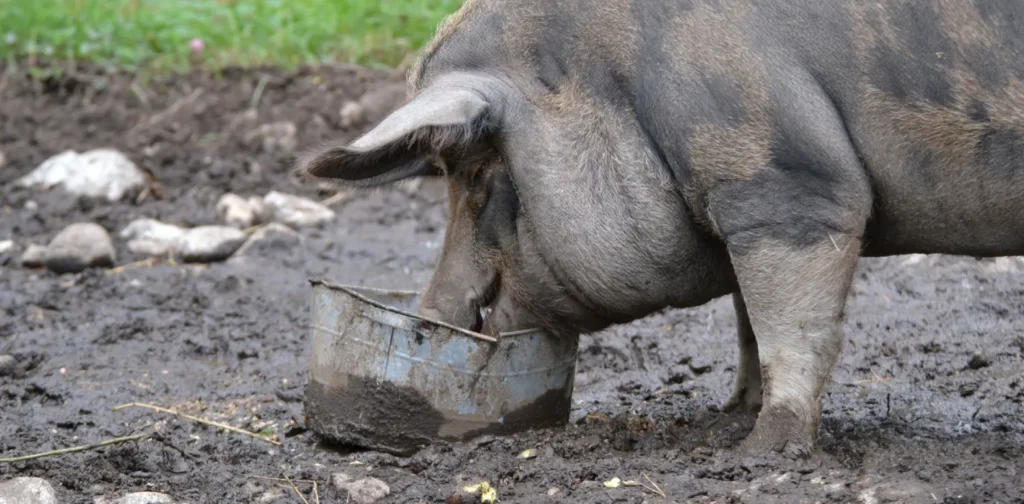Feeding Food Waste to Pigs as a Sustainable Solution

Photo: Jean Beaufort on Needpix
Food is a crucial aspect of society as we all need to eat to survive. Unfortunately, food production and consumption has been harming the planet in various ways. As climate change concerns rise, finding sustainable solutions to the growing global food demand and mounting waste is important. In this light, feeding food waste to pigs has emerged as an innovative solution to reduce ecological footprint.
Feeding Food Waste to Pigs
Studies suggest that compared to other farmed animals, pigs are capable of digesting a broader variety of food by-products and consumer leftovers. Modern domesticated pigs are descended from wild boars that scavenged for food around human settlements. Over time, many cultures have raised pigs to help recycle household waste.
Nowadays, pork is one of the most consumed meats globally, accounting for 34% of the meat consumed globally in 2022. This demand is met with how global pork production has increased by 140% from 1961 to 2021.
Therefore, feeding food waste to pigs can become a significant action that alleviates the environmental pressures associated with sourcing conventional pig feed, such as soy and corn. This practice also helps reduce food waste, one of the largest contributors to landfill mass and greenhouse gas emissions.
Economically, it can also reduce feed costs for farmers, as commercial pig feed can be expensive. So, using food scraps that would otherwise go to waste can offer a more sustainable and cost-effective alternative. Studies show that replacing just 10% of conventional feed with food waste can reduce greenhouse gas emissions by up to 15% and habitat destruction by 30%.
Biosecurity and Quality Control
A study conducted in Switzerland found that feeding pigs food waste, including chocolate, pasta, and breakfast cereal, had no adverse effects on the quality of the pork produced.
However, proper safety management is vital. In many countries, strict regulations exist to prevent the transmission of diseases through animal feed. In New Zealand and Australia, for instance, it is illegal to feed food waste that contains meat or has come into contact with meat due to the risk of spreading diseases like the African Swine Fever and the Foot-and-Mouth Disease. The potential for disease transmission highlights the need for strict biosecurity protocols and quality control measures to ensure the safety of both animals and consumers.
Furthermore, farmers must consider the variability of food scraps to formulate a consistent and balanced diet for pigs. They also need to adopt strict measures to avoid contamination and ensure that the food waste is free from harmful chemicals or pathogens. Adequate storage, processing, and treatment systems are crucial to mitigate any risks.
Toward Sustainability
Feeding food waste to pigs is a promising step toward more sustainable and better food systems. However, for this practice to be widely successful and safe, clear regulations, stringent monitoring, and education for farmers are essential.
With significant investment in infrastructure and the right protocols in place, food waste can be repurposed as a valuable resource, helping to tackle food security challenges while promoting sustainability.
Editor: Nazalea Kusuma

Co-create positive impact for people and the planet.
Amidst today’s increasingly complex global challenges, equipping yourself, team, and communities with interdisciplinary and cross-sectoral insights on sustainability-related issues and sustainable development is no longer optional — it is a strategic necessity to stay ahead and stay relevant.
Theresia Carissa
Theresia is a Reporter Intern at Green Network Asia. She is a final year undergraduate student majoring in Public Policy and Management at Gadjah Mada University.


 Africa’s Solar Energy Surge: Why 2025 Was a Breakthrough Year
Africa’s Solar Energy Surge: Why 2025 Was a Breakthrough Year  Agrihoods: Integrating Farms and Urban Neighborhoods into Sustainable Communities
Agrihoods: Integrating Farms and Urban Neighborhoods into Sustainable Communities  Women in Waste Management: Asia’s Circularity Runs on Women. Its Policies Still Don’t
Women in Waste Management: Asia’s Circularity Runs on Women. Its Policies Still Don’t  Embracing the Business Value of Sustainability
Embracing the Business Value of Sustainability  American Farmers Call for Government Support Amidst PFAS Contamination
American Farmers Call for Government Support Amidst PFAS Contamination  Asia Pacific’s SDG Progress Faces Major Setbacks
Asia Pacific’s SDG Progress Faces Major Setbacks